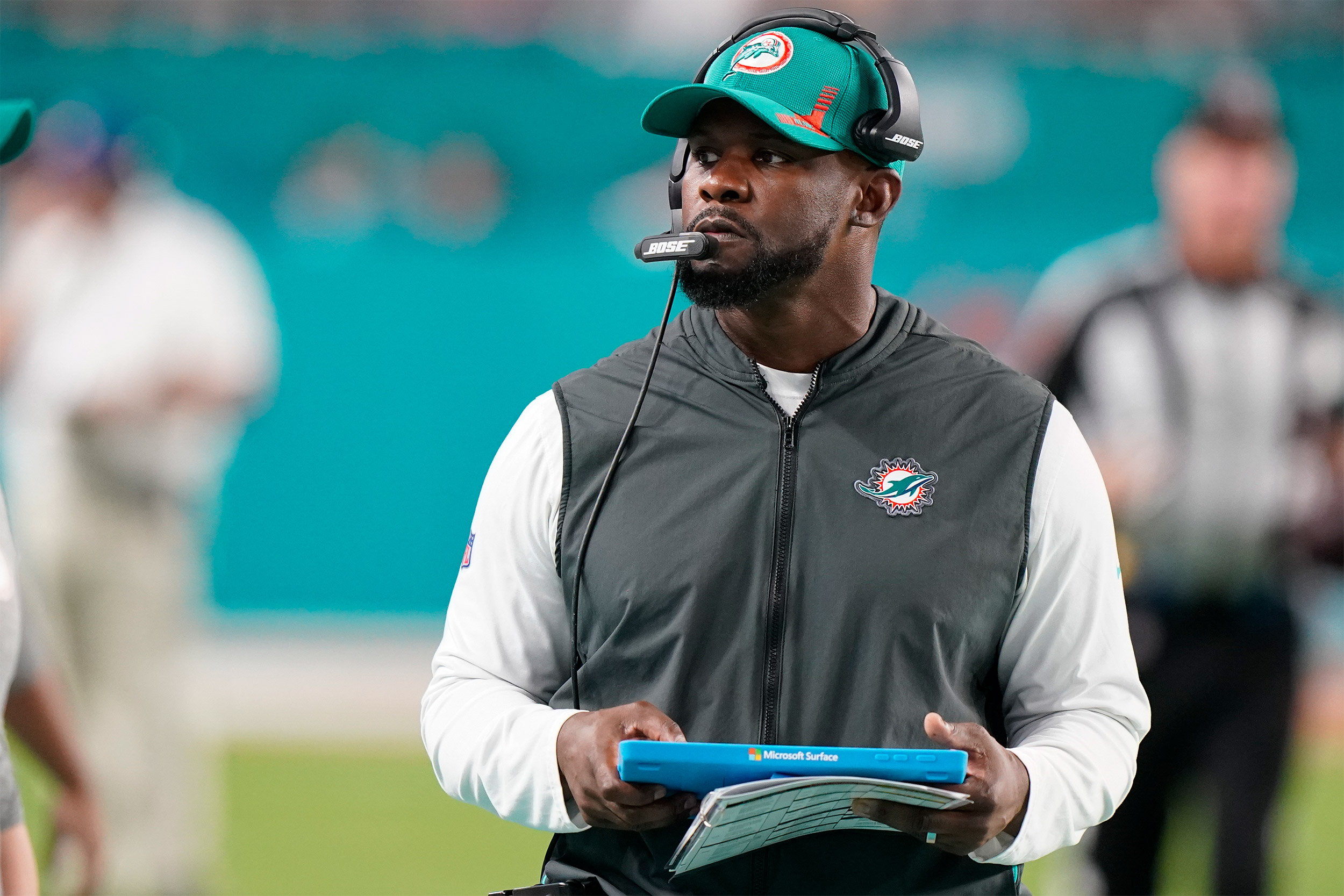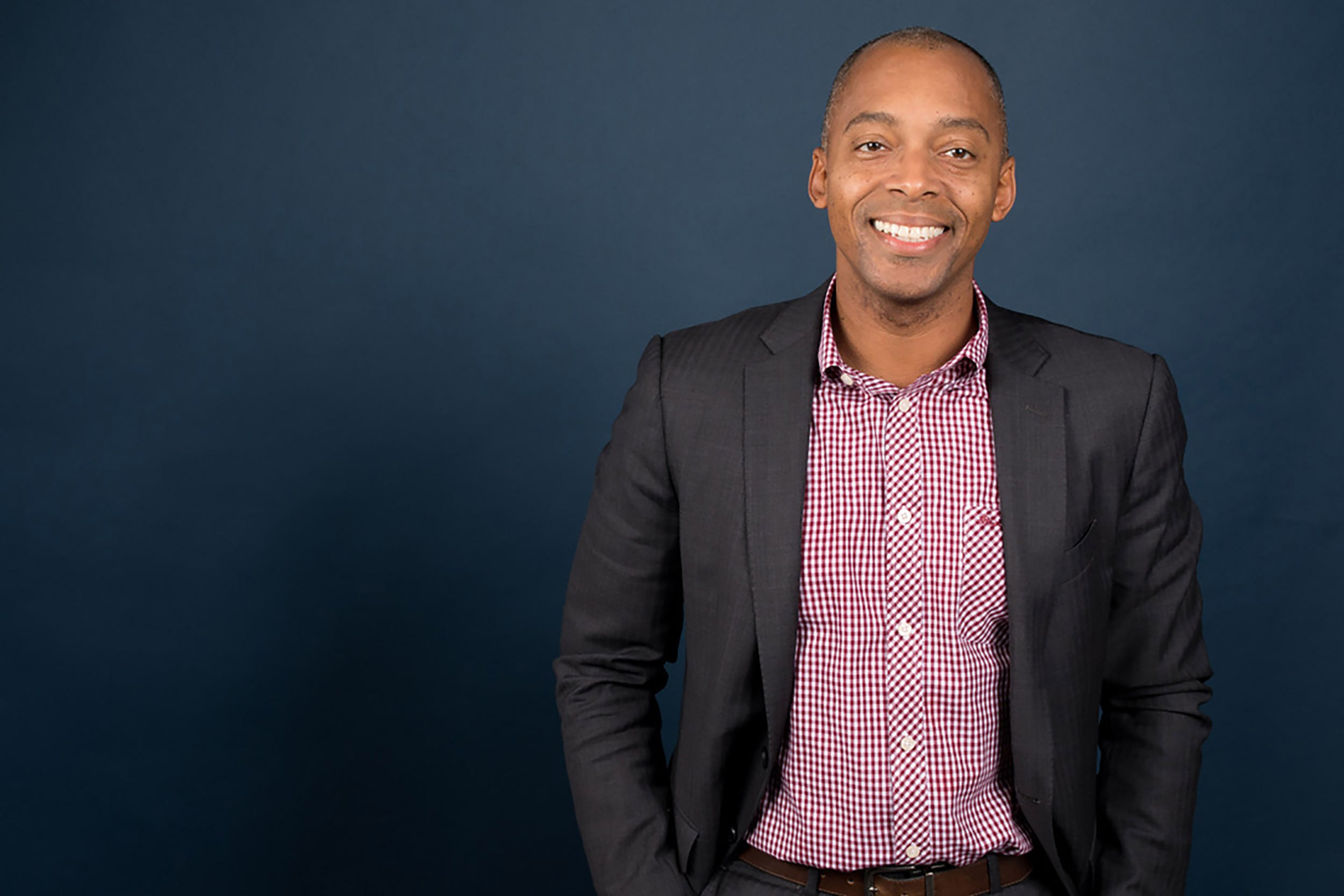
Miami Dolphins head coach Brian Flores was fired on Jan. 10, later filing a lawsuit against the NFL for discriminatory hiring and retention practices.
AP Photo/Wilfredo Lee
Examining Brian Flores’ suit against NFL
Kennedy School’s Muhammad sees some lessons about hiring, diversity, ‘fit,’ and implicit bias
Are National Football League team owners systematically shutting out Black candidates from head coaching jobs? A former Miami Dolphins head coach says yes.
In a lawsuit filed in federal court this month, Brian Flores accuses the NFL of discriminatory hiring and retention practices that deny Black candidates an equal opportunity despite the League’s “Rooney Rule,” which requires teams to interview at least one Black candidate for coaching or front-office vacancies. (Next season, only three of the league’s 32 teams will have a Black head coach.)
Flores also says that Black coaches are paid less and fired more quickly than white coaches, even when their job performance is better. Flores was let go in January despite having prior back-to-back winning seasons, and he has been rejected for jobs with other teams. Black coaches have long complained that they get called for interviews just to comply with the rule but don’t get hired.
In a statement, the NFL said the suit was “without merit.”
The Gazette spoke to Khalil Gibran Muhammad, Ford Foundation Professor of History, Race and Public Policy at Harvard Kennedy School and director of the Institutional Antiracism and Accountability Project, a research initiative that studies the efficacy of policies to make workplaces more diverse, equitable, and inclusive, about the lawsuit and why so many companies have not made greater strides around diversity. The interview has been edited for clarity and length.
Q&A
Khalil Gibran Muhammad
GAZETTE: What’s the potential importance of this lawsuit?
MUHAMMAD: I think that it is both important in the substance of the charges, and it’s important that it’s being publicly disclosed. Sometimes people have to dig into court proceedings and court filings to know that a lawsuit has occurred in the first place. In this instance, it’s clear that Flores and his legal team see this as an opportunity to structurally change the way the NFL operates.
Some of the other claims regard game fixing — there’s a way to see the line between what some researchers call “glass cliffs,” where Black people and/or women or other minorities are brought into firms when things aren’t good, and they’re set up to fail. It’s sort of a “diversity moment” and then you move on — that’s even more disturbing in some ways, for all sorts of reasons. But particularly on the question of diversity because it suggests that we have no idea how deep this problem is and how long. There haven’t been a lot of Black football coaches, but the extent that they have faced these kinds of challenges is significant.
GAZETTE: Flores has said that he’s looking for systemic changes. If he ends up settling with the league, would that undermine its value as a tool for change?
MUHAMMAD: Yes, but settlements in and of themselves often do lead to change because the legal liability that comes with the precedent of settlement of this kind can often change behavior, as well. It’s not like Colin Kaepernick, who’s alleging collusion within the league to keep him from playing. That’s not something to solve for. But in the case of Brian Flores, if they settle, people will conclude that the NFL is admitting guilt even though it is not, and it will establish a precedent so that it may face future lawsuits on just the simple prima facie evidence that teams have not given due diligence to the Rooney Rule.
GAZETTE: In some ways, is the public nature of the conduct alleged and NFL’s history with race helpful in demonstrating what systemic racism is, as Flores has claimed, and how it works for those who have not experienced it or doubted whether it truly existed?
MUHAMMAD: It’s a really good question. I think two things: First, the NFL is a unique actor as a small monopoly of owners who can essentially agree to set certain rules that fall within their rights as corporations. And so, they do have monopoly power, to some degree, over how they govern themselves in ways that aren’t true with competitive firms as standalone firms. In that sense, the weight of this lawsuit means that you’ve got 32 firms acting in bad faith by implication. Not by evidence, but by implication. Second is how thoroughly documented the absence of Black leadership, managerial leadership, and coaching leadership is in an industry with 70 percent Black players. So yes, the numbers do speak for themselves, and the history of the league speaks for itself.
Here’s the thing: Even with that history, with those numbers, we still live in a society where you can line up all the evidence and still people walk away and say, “It’s a meritocracy. Brian Dabell [who was recently hired by the New York Giants over Flores] is the better coach. They had every right to pick who they want. It’s a free country. They’re private employers.” And we move on. As someone who teaches the history of structural racism, I’m very well aware of how evidence is not often sufficient to change behavior. That’s true in a lot of diversity research on organizations.

“Employers are still people who have preferences. And, particularly in the private sector, those preferences are rooted in their own social networks,” said Harvard Kennedy School’s Khalil Gibran Muhammad.
Photo by Martha Stewart
More like this
GAZETTE: Team owners decide who to hire. Thirty of the 32 NFL teams are white-owned; none are owned by Blacks. Some may argue that nobody set out to discriminate or prevent Black people from getting head coaching jobs. It’s just that people tend to gravitate to those they may already know or at least feel most comfortable with. Flores argues the data show that it’s clearly racial discrimination. How can we distinguish between the two?
MUHAMMAD: The question of fit and social networks, the sort of race-neutral exclusionary practices of companies, has been a 75-year-old defense for the lack of representation in all sorts of industries, including civil service. Who you know in proximity to decision-makers often matters to who gets hired. And then, even if you’re proximate to opportunities, but don’t fit the image, you might not get hired. Obviously, gender has mattered tremendously across all racial and ethnic categories, and race has been a significant roadblock to fit. Implicit bias research is overwhelmingly convincing that prejudice does matter in terms of individual decision-making. Also, lived experience sometimes means that people have a different set of perspectives to bring to an organization. Diversity and equity research says that’s usually a net positive for an organization because they don’t know what they don’t know, or they don’t know what ways in which lived experience will benefit them.
Here’s an interesting way to think about the Brian Flores lawsuit: Let’s say the fit problem in Flores’ case wasn’t that he happened to be Black and had to bear the historical stigma of maybe being thought to be not as qualified as someone else. Let’s say it’s very specific to him. That he may have been fired because he didn’t take instruction from the team owner. Then it’s like, “Well, this guy doesn’t listen.” Is that a good reason not to hire somebody? Most managers would say, “Yeah. If he doesn’t follow orders, I don’t want the guy working for me.” So, it’s impossible to disentangle all those factors, and it’s precisely the complexity and the dynamism and nuances of decision-making that makes nailing this problem so difficult. We’re mostly stuck looking at the lack of diversity and saying, “We are no longer going to accept that there aren’t qualified people who should be represented in the ranks of leadership in this organization.”
GAZETTE: The literature shows workplaces that are diverse from top to bottom perform better, are more competitive, more innovative. And yet, so many aren’t making strides around diversity, equity, and inclusion over the last five years, according to a 2020 McKinsey report. What’s the disconnect?
MUHAMMAD: Employers are still people who have preferences. And, particularly in the private sector, those preferences are rooted in their own social networks. Therefore, we shouldn’t be surprised that people are not necessarily interested in what they might consider the risky business of bringing in outsiders to a culture that they feel quite comfortable with.
We just held the Truth and Transformation Conference and heard from a lot of practitioners. CEOs are still skeptical of the diversity win-win arguments. It’s not just the argument that the firm itself will perform better; it’s also that the economics of diversity means that companies are less efficient and less productive in the long run. They will improve their bottom line as a result of pursuing these racial equity goals. And yet, right now, there are a number of CEOs and boards of directors that express skepticism about what these numbers mean. I’m not smart enough to be able to explain in all those instances what is driving that other than to say that people’s preferences die hard.
And there is a fair amount of risk averseness to the kind of structural change that is being called for in terms of racial reckoning and racial equity goals. That shouldn’t surprise us because less than 4 percent across public, private, and nonprofit sectors in terms of counting Black leadership means that it would be a significant change to see two to three times growth across those areas. People are just not necessarily buying the argument that the company will make more money and make smarter decisions. They’re just not buying it.








